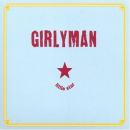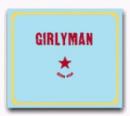In the back of a camouflage truck
They locked me in once with the materiel
I was full of a rage no one could handle
I was a private in the army
All the real girls with their backs turned called me crazy
Called me crazy
I worked for a while at a diner
Manager said I had to wear that little uniform
Said I was part of the problem
But I was in love with that blonde girl
She kissed me twice behind the counter
But when I asked her to get into my car
She called her man, said 'don't bother her'
She called her man, said 'don't bother her'
I guess I'll feel less than real all my life
With these feathers I made
Under me lifting me up
But I was a young James Dean
With a way with ladies
All the real boys in their black jeans called me crazy
Called me crazy
Called me crazy
Called me crazy
They locked me in once with the materiel
I was full of a rage no one could handle
I was a private in the army
All the real girls with their backs turned called me crazy
Called me crazy
I worked for a while at a diner
Manager said I had to wear that little uniform
Said I was part of the problem
But I was in love with that blonde girl
She kissed me twice behind the counter
But when I asked her to get into my car
She called her man, said 'don't bother her'
She called her man, said 'don't bother her'
I guess I'll feel less than real all my life
With these feathers I made
Under me lifting me up
But I was a young James Dean
With a way with ladies
All the real boys in their black jeans called me crazy
Called me crazy
Called me crazy
Called me crazy
Contributed by Bernart Bartleby - 2015/11/9 - 11:03
E va be', anche a me è capitato di trovarsi nello stesso letto con un giovane scultore rumeno (per dormire, intendiamoci bene, in un albergo dove per risparmiare il nostro datore di lavoro italiano ha pagato la stanza matrimoniale :), che fu proprio una "fotocopia" di James Dean. E con questo???
Da noi si diceva una volta:
"Non importa chi dorme con chi, basta che i bambini sono sani." : D
Da parte mia posso solo aggiungere che su certi discorsi non bisogna andare troppo serio, secondo me, altrimenti si alimenti soltanto tante polemiche inutili e noiose, che è peggio...
La canzone non è male comunque :)
Crazy forever
krzyś
Da noi si diceva una volta:
"Non importa chi dorme con chi, basta che i bambini sono sani." : D
Da parte mia posso solo aggiungere che su certi discorsi non bisogna andare troppo serio, secondo me, altrimenti si alimenti soltanto tante polemiche inutili e noiose, che è peggio...
La canzone non è male comunque :)
Crazy forever
krzyś
krzyś - 2015/11/9 - 21:39
×
![]()
Note for non-Italian users: Sorry, though the interface of this website is translated into English, most commentaries and biographies are in Italian and/or in other languages like French, German, Spanish, Russian etc.







Parole e musica di Tylan "Ty" Greenstein
Nell’album intitolato “Little Star”, pubblicato nel 2005
“I guess this song is sort of my ode to tomboys who remained tomboys and perhaps became even bigger tomboys as they got older, such as myself. So this is called Young James Dean.” (Ty Greenstein, come riportato in “The Queer Sounds of Justice”, di S.M. Gray, tesi presso il Wellesley College, scuola superiore artistica femminile di Wellesley, Massachusets, USA)
Una canzone dedicata alle donne omosessuali, e in particolare le “tomboys” (o “butches”), traducibile come “maschiacce”, che hanno in James Dean - e soprattutto quello di “Rebel Without A Cause” (“Gioventù bruciata”, di Nicholas Ray, 1955) - una delle loro icone.
Ty Greenstein scrisse questo brano dopo aver letto “The Last Time I Wore A Dress” (1997) di Daphne Scholinski, nativa di Chicago (oggi molto noto artista transgender col nome di Dylan Scholinski) che negli anni 80, quando era adolescente, venne internata in una clinica psichiatrica con la diagnosi di “disordine dell’identità sessuale”. Durante il lungo ricovero la ragazzina “maschiaccia” fu sottoposta ad un feroce programma di “ricondizionamento” in cui veniva costretta a comportarsi da femmina, a truccarsi, pettinarsi e vestirsi da femmina…
Ma “Young James Dean” va ancora più indietro nel tempo, agli anni 50 e 60 quando la comunità gay e lesbica cominciava a muovere i suoi primi passi allo scoperto, con grande fatica e pericolo: “[L’ho scritta] pensando alle generazioni che sono venuto prima… In quesgli anni essere gay non era solo strano, era inaccettabile e in molti ambienti si era bollati come pazzi, come fuori di testa socialmente pericolosi…” (Ty Greenstein)
La prima strofa, poi, è dedicata al trattamento spesso riservato agli omosessuali – maschi e femmine - nell’esercito…